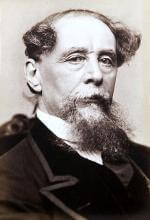
Biographie de Charles Dickens
Charles Dickens was born at Portsmouth on 7 February 1812, the second of eight children. Dickens's childhood experiences were similar to these depicted in David Copperfield. His father, who was a government clerk, was imprisoned for debt and Dickens was briefly sent to work in a blacking warehouse at the age of twelve. He received little formal education, but taught himself shorthand and became a reporter of parliamentary debates for the Morning Chronicle.
He began to publish sketches in various periodicals, which were subsequently republished as Sketches by Boz. The Pickwick Papers were published in 1836-7 and after a slow start became a publishing phenomenon and Dickens's characters the centre of a popular cult. Part of the secret of his success was the method of cheap serial publication which Dickens used for all his novels. He began Oliver Twist in 1837, followed by Nicholas Nickleby (1838) and The Old Curiosity Shop (1840-41).
After finishing Barnaby Rudge (1841) Dickens set off for America; he went full of enthusiasm for the young republic but, in spite of a triumphant reception, he returned disillusioned. His experiences are recorded in American Notes (1842). Martin Chuzzlewit (1843-4) did not repeat its predecessors' success but this was quickly redressed by the huge popularity of the Christmas Books, of which the first, A Christmas Carol, appeared in 1843.
During 1844-6 Dickens travelled abroad and he began Dombey and Son while in Switzerland. This and David Copperfield (1849-50) were more serious in theme and more carefully planned than his early novels. In later works, such as Bleak House (1853) and Little Dorrit (1857), Dickens's social criticism became more radical and his comedy more savage. In 1850 Dickens started the weekly periodical Household Words, succeeded in 1859 by All the Year Round; in these he published Hard Times (1854), A Tale of Two Cities (1859) and Great Expectations (1860-61).
Dickens's health was failing during the 1860s and the physical strain of the public readings which he began in 1858 hastened his decline, although Our Mutual Friend (1865) retained some of his best comedy. His last novel, The Mystery of Edwin Drood, was never completed and he died on 9 June 1870. Public grief at his death was considerable and he was buried in the Poets' Corner of Westminster Abbey.
Jeremy Tambling is Professor of Comparative Literature, University of Hong Kong. He is interested in opera, and film and in medieval and confessional literature, as in Confession: Sexuality, Sin, the Subject (1990). His book Becoming Posthumous (2001) is an exploration of literary theory, while in relation to nineteenth-century and modernist studies, he is author of Dickens, Violence and the Modern State (1995), Henry James (2000) and Lost in the American City: Dickens, James, Kafka (2001).
